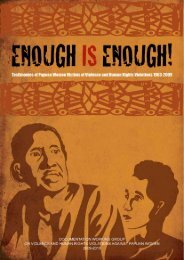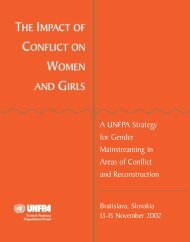IANSA [PDF, 2MB] - PeaceWomen
IANSA [PDF, 2MB] - PeaceWomen
IANSA [PDF, 2MB] - PeaceWomen
You also want an ePaper? Increase the reach of your titles
YUMPU automatically turns print PDFs into web optimized ePapers that Google loves.
Case Study<br />
Case 1: Crimes committed in the name of honour<br />
From Sisterhood Is Global Institute (SIGI)<br />
these crimes. Public perception can sometimes be<br />
considered more important than the life of female<br />
family members. According to a survey released in<br />
March 2011, Jordanian families are more worried<br />
about how they are perceived by their own communities<br />
when bringing up their daughters, rather than<br />
how existing laws protect their female family members.<br />
80.9% of parents interviewed believe that protecting<br />
a girl means protecting the family honour,<br />
while 89.1% of parents believe that daughters should<br />
obey their brothers. 40<br />
In September 2011, Amman’s criminal court prosecutor<br />
charged a man with premeditated murder after<br />
he confessed to shooting dead his 24-year-old widowed<br />
daughter in hospital after she gave birth to<br />
twins in Deir Alla in the Jordan Valley. The suspect is<br />
quoted as saying, “I was shocked that she was pregnant.<br />
I was enraged and shot her dead because she<br />
did something shameful.” The woman had been a<br />
widow for four years. “The man claimed he wanted to<br />
check on the condition of his daughter ... then he<br />
shot her in the head,” said Ahmad Hwarat, head of<br />
the hospital where the killing took place. Women<br />
interviewed pointed to the regional proliferation of<br />
small arms and availability of guns as an important<br />
factor in the perpetration of crimes committed in the<br />
name of honour:<br />
“We are in a conflict area, which means<br />
there is a large availability of guns. Many of<br />
the crimes committed in the name of honour<br />
are conducted with pistols.” – Interview,<br />
Human Forum for Women’s Rights,<br />
Amman, Jordan, May 2011<br />
Although murder is punishable by death in Jordan,<br />
in crimes committed in the name of honour courts<br />
can commute or reduce sentences, particularly if the<br />
victim’s family asks for leniency. 41 Article 98 of the<br />
Jordanian penal code allows for lenient treatment of<br />
those who commit a crime in a “state of fit or fury”<br />
resulting from an unlawful or dangerous act on the<br />
part of the victim. In practice, this provision is often<br />
applied to benefit men who commit crimes in the<br />
name of honour against women. 42 Between 15 and<br />
20 such crimes occur in Jordan each year. 43<br />
Two cases studies of crimes committed in the name<br />
of honour highlight how the availability of small arms<br />
undermines women’s rights in Jordan. Both cases<br />
show ways in which male family members use<br />
firearms to control women’s lives and sexuality and<br />
enforce their own versions of private justice, based on<br />
the idea that family honour is sometimes worth more<br />
than a woman’s life. Furthermore, the cases demonstrate<br />
the failures of the current institutional justice<br />
system to protect women and enforce women’s<br />
rights and the importance that private justice continues<br />
to play in women’s lives.<br />
The following testimony is unique, as the victim survived,<br />
but was permanently disabled by the attack.<br />
This story highlights the serious consequences of<br />
the availability of small arms and their ability to<br />
destroy women’s lives. The case also shows the<br />
failure of the institutional justice system to protect<br />
women from gun violence and the central role<br />
played by private justice in Jordanian society.<br />
I just turned thirty years old. I cannot move normally<br />
and cannot live a normal life.<br />
It all happened when I challenged my family a few<br />
years ago. I decided to get a divorce. My husband<br />
was much older than me and he was mentally ill.<br />
He would beat me and harass me. So I went to<br />
Family Protection and got a divorce through them.<br />
My family did not approve. They thought it would<br />
dishonour them. They are not religious, but they<br />
care about their image. When I got a divorce, they<br />
refused to receive me in their house or see me.<br />
They told everyone that my husband and I had left<br />
to go to Saudi Arabia.<br />
I was fine without them. I depended on myself. I<br />
worked by teaching English classes, cooking and<br />
selling food and doing housework. I stood on my<br />
own legs. I kept a low profile and my family didn’t<br />
bother me.<br />
One day, I had a car accident. I had to go to the<br />
police station to give details and go through security<br />
procedures. I called my family to ask them to<br />
pick me up. They refused. I called my friend, who<br />
sent her husband to pick me up.<br />
Suddenly, as we were driving, a car stopped next<br />
to ours. My uncles got out. They had a gun, and<br />
pointed it at us. They made me get out of the car<br />
and into theirs. They drove me to an isolated,<br />
abandoned part of town. There, they shot me with<br />
a 38 mm revolver. I received 18 bullets in the legs<br />
and waist. I pretended to be dead. They called my<br />
younger brother, to come pick me up and to pretend<br />
that he did the shooting and that he killed me<br />
for family honour but my brother saw I was alive<br />
and took me to the hospital.<br />
There, my left leg began to rot. After few months, I<br />
could see worms start eating my rotting flesh. They<br />
had to amputate my leg.<br />
In the court case, my younger brother testified that<br />
he had shot me for reasons of honour. He was a<br />
minor at the time, so he would get a reduced sentence.<br />
But he came to visit me in the hospital, and<br />
when he saw the worms eating my leg, he withdrew<br />
his testimony and said he wasn’t guilty.<br />
After many operations and months in several hospitals,<br />
they sent me to jail because I was unable to<br />
pay the hospital fees.<br />
It was Lubna Dawany 47 who saved me. I wouldn’t<br />
be here if it hadn’t been for her. She got me out of<br />
jail and found funds to get me a prosthetic leg. She<br />
took care of me and helped me find odd jobs.<br />
My entire family, including my mother, refused to<br />
speak to me. They want me to drop charges in the<br />
case. I am entirely alone. With my disability, it is difficult<br />
to work, but I try.<br />
This testimony was recorded in April 2011. No one<br />
has been found guilty. The case is now in the<br />
process of appeal. The victim decided to instruct<br />
another lawyer because she believed that the first<br />
lawyer was working together with her family and<br />
not in her interest. Yet she did not hire Lubna as her<br />
lawyer because she feared for Lubna’s safety in<br />
defending such a case although Lubna provides<br />
her with support. She still has the scars of her exhusband<br />
beating her with a knife. She will not be<br />
able to marry again.<br />
16 17


![IANSA [PDF, 2MB] - PeaceWomen](https://img.yumpu.com/25206379/9/500x640/iansa-pdf-2mb-peacewomen.jpg)

![Commitments Sample [PDF, 93KB] - PeaceWomen](https://img.yumpu.com/25206331/1/190x245/commitments-sample-pdf-93kb-peacewomen.jpg?quality=85)











![A Toolkit for Advocacy and Action [PDF, 260KB] - Peace Women](https://img.yumpu.com/25205989/1/190x245/a-toolkit-for-advocacy-and-action-pdf-260kb-peace-women.jpg?quality=85)